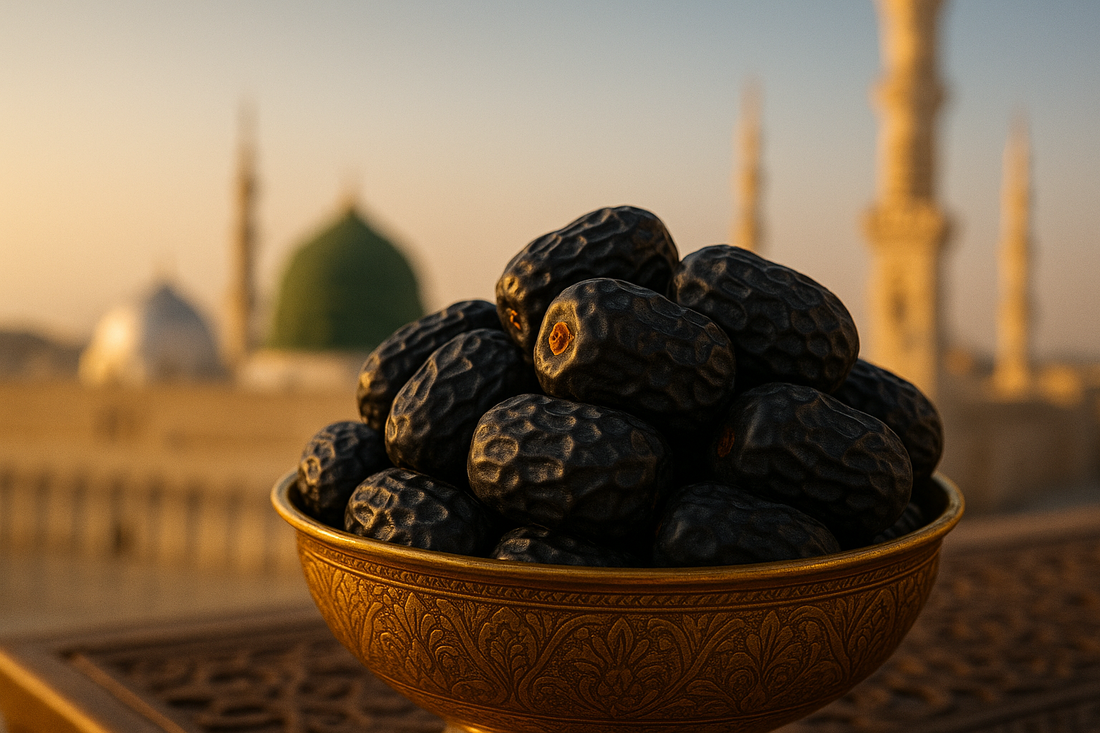
Ajwa Dates Benefits, Origin, Grades & Taste
Share
- Nutritional and Health Benefits of Ajwa Dates
- Ajwa Date Grading: How Quality is Measured
- Ajwa Dates Taste Profile
- How to Consume Ajwa Dates
- Storage and Shelf Life
- Conclusion
-
- Q1. What are the different grades of Ajwa dates?
- Q2. How do Ajwa dates taste?
- Q3. How can I identify original Ajwa dates?
- Q4. What is the best type of Ajwa date?
- Q5. What did the Prophet (PBUH) say about Ajwa dates?
- Q6. Which is better: Ajwa or Safawi dates?
- Q7. Which variety of dates did the Prophet (PBUH) eat?
- Q8. How many Ajwa dates should I eat per day?
- Q9. Which variety of dates is best overall?
Nutritional and Health Benefits of Ajwa Dates
Ajwa dates are packed with natural goodness, combining essential nutrients, plant compounds, and healing antioxidants. Their daily consumption offers a wide range of health advantages:
1. Rich in Antioxidants
- Reduced risk of chronic diseases
- Strengthened immune response
- Protection from cardiovascular issues and inflammation
2. Supports Heart Health
Ajwa dates are naturally high in potassium and magnesium, minerals vital for maintaining healthy blood pressure and heart rhythm. Their fibre content helps reduce LDL cholesterol, enhancing arterial health and circulation.
3. Natural Energy Booster
- Pre-workout fuel
- Breaking fast during Ramadan
- Midday energy boost
4. Digestive Aid
Ajwa dates are rich in soluble and insoluble fibres, promoting healthy digestion and preventing constipation. They improve gut health by feeding beneficial gut bacteria and relieving bloating.
5. Strengthens Bones and Joints
- Ageing adults at risk of osteoporosis
- Women during pregnancy
- Individuals with arthritis or joint pain
6. Boosts Brain Function
With nutrients like vitamin B6, iron, and antioxidants, Ajwa dates help enhance cognitive performance, reduce mental fatigue, and protect against neurodegenerative diseases such as Alzheimer’s.
7. Regulates Blood Sugar (In Moderation)
- Stabilise blood sugar
- Reduce sugar cravings
- Offer a natural alternative to refined sugars
Ajwa Date Grading: How Quality is Measured
1. Premium (Royal) Grade Ajwa
- Large-sized, soft, and uniform in shape
- Grown exclusively in central Madinah farms
- Rich in colour (dark brown to black) and deeply wrinkled skin
- Highly valued for gifting, especially during Ramadan and the Hajj season
2. Grade A Ajwa
- Medium size, slightly firmer texture
- Mildly glossy surface with fewer wrinkles
- Excellent for daily consumption
- Affordable without compromising on nutrition
3. Grade B or Regular Ajwa
- Smaller or mixed sizes
- May include more wrinkles or slight dryness
- Still nutritionally rich, but less aesthetically appealing
- Commonly used for bulk sale or industrial use
When purchasing, always verify the source and ensure the Ajwa dates are Medina-origin certified to experience the true essence of this sacred fruit.
Ajwa Dates Taste Profile
- Texture: Soft, chewy, and slightly fibrous
- Sweetness: Mild natural sweetness—not overly sugary
- Aftertaste: Earthy with a hint of spice and cocoa
- Colour: Deep black to dark brown, with a shiny, wrinkled skin
They’re not only a nutritional powerhouse but also a sensory delight, making them a perfect complement to both sweet and savoury dishes or simply enjoyed on their own.
How to Consume Ajwa Dates
- Eaten on an empty stomach in the morning (3–7 dates)
- Blended with milk or almond milk for an energy drink
- Added to smoothies, oatmeal, or energy balls
- Used as a natural sugar replacement in desserts
Ajwa dates are also excellent for children, athletes, and the elderly due to their high-energy, low-fat content.
Storage and Shelf Life
Ajwa dates should be stored in a cool, dry place, preferably in an airtight container to retain moisture and texture. When properly stored, they can last up to 12 months without refrigeration and even longer when refrigerated.
Avoid exposure to direct sunlight and excessive humidity to preserve freshness.
Conclusion: Ajwa Dates Are More Than Just a Superfood
Ajwa dates are a gift of nature and history. With their remarkable health benefits, rich origin in Medina, premium grading standards, and exquisite taste, they remain one of the most coveted fruits in the world. Whether consumed for their spiritual value, health-boosting properties, or simply for their indulgent taste, Ajwa dates are a worthy addition to your daily lifestyle.
If you're looking to purchase authentic, high-quality Ajwa dates, visit Al Madni Trader to explore premium varieties delivered across Pakistan.
FAQs
Q1. What are the different grades of Ajwa dates?
Ajwa dates are typically graded based on their size, texture, and overall appearance. The most common grades include:
- Premium (Royal Ajwa) – Large, soft, moist, and glossy with intact skin.
- Medium Grade – Slightly smaller in size, moderately soft, and less shiny.
- Commercial Grade – More common, drier, and sometimes with surface wrinkles or minor imperfections.
Higher-grade Ajwa dates usually come from early harvests and are carefully sorted for quality and uniformity.
Q2. How do Ajwa dates taste?
Ajwa dates have a unique and mild sweetness that’s less sugary than other date varieties. Their taste carries subtle hints of caramel and cinnamon, with a soft and slightly fibrous texture. They are not overly sticky and feel rich on the palate, making them a delightful treat for both everyday snacking and spiritual significance.
Q3. How can I identify original Ajwa dates?
- Colour: Dark brown to almost black with a soft sheen.
- Texture: Soft yet firm, not too dry or mushy.
- Size & Shape: Medium to large, oval-shaped with natural wrinkles.
- Origin: Always check if they’re sourced from Al-Madinah, Saudi Arabia, the only true origin of authentic Ajwa.
Beware of imitations labelled as Ajwa but grown outside Madinah—they lack the same taste and blessings associated with the original.
Q4. What is the best type of Ajwa date?
The Royal Ajwa or First Grade Ajwa is considered the best. These are harvested from the Madinah region and are larger, juicier, and more flavorful than lower-grade varieties. They're typically handpicked and packaged with extra care to preserve their natural qualities.
Q5. What did the Prophet (PBUH) say about Ajwa dates?
The Prophet Muhammad (PBUH) highly praised Ajwa dates. According to a well-known Hadith from Sahih al-Bukhari:
“Whoever eats seven Ajwa dates in the morning, neither magic nor poison will harm him that day.”
This Hadith emphasises both the spiritual and physical benefits of Ajwa, making it not just a food but a Sunnah practice.
Q6. Which is better: Ajwa or Safawi dates?
- Ajwa is spiritually significant, mildly sweet, and soft.
- Safawi is darker, slightly more fibrous, and has a richer sweetness.
If you’re looking for spiritual value and tradition, Ajwa is ideal. For everyday indulgence with a deeper sweetness, Safawi is a great pick.
Q7. Which variety of dates did the Prophet (PBUH) eat?
The Prophet (PBUH) is recorded to have regularly consumed Ajwa dates, particularly those grown in Madinah. However, he also enjoyed other varieties such as Barni and Sukkari. Ajwa holds a special status due to the blessings mentioned in the Hadith.
Q8. How many Ajwa dates should I eat per day?
The Sunnah suggests eating seven Ajwa dates in the morning, based on the Hadith for protection from harm. However, for general health, 3 to 7 dates daily is sufficient. They're rich in nutrients, so moderation is key, especially for those managing blood sugar levels.
Q9. Which variety of dates is best overall?
- For spiritual value: Ajwa dates.
- For natural sweetness: Sukkari dates.
- For an energy boost: Medjool dates.
- For rich flavour: Safawi dates.
Among all, Ajwa dates stand out due to their religious significance, unique taste, and health benefits, making them a top choice for many.
